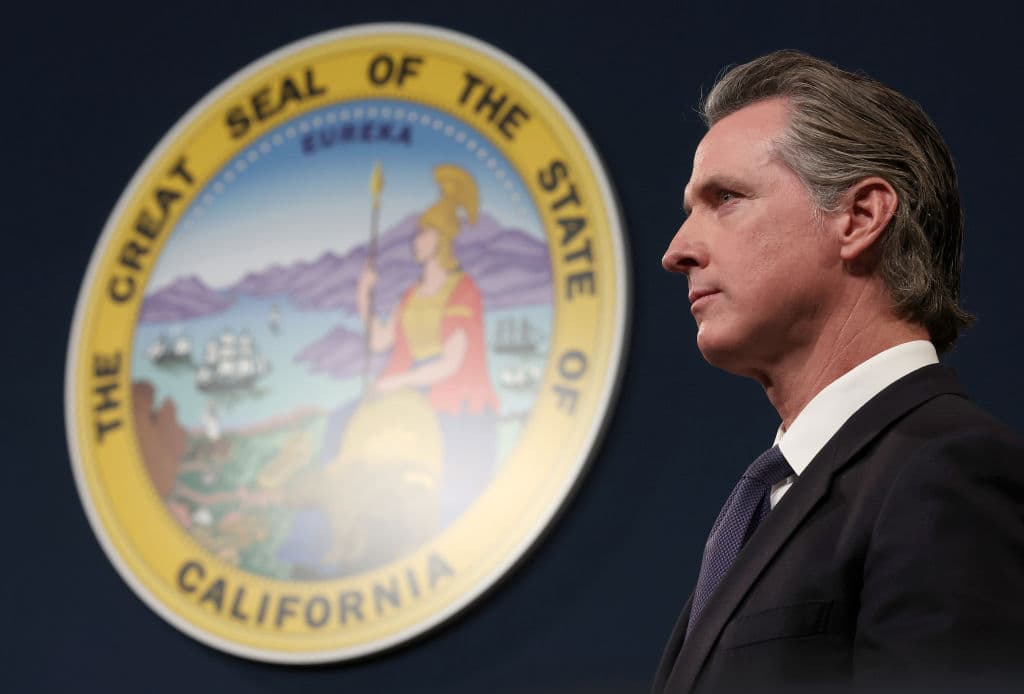California, Grappling With a Retail Theft Crisis, Reaches Its ‘Tipping Point’
Momentum is growing to reform the state’s 2014 voter-enacted Proposition 47, which critics say led to ‘an explosion in retail and cargo theft’ causing store closures and ‘billions of dollars in economic losses.’

For nearly 10 years, a voter-enacted measure known as Proposition 47 — which reduced penalties for drug offenses, petty theft, and commercial burglary — has been the law of the land in California.
Yet that could change as the state battles a wave of retail theft, often captured in viral social media videos and the press, causing many stores to lock up everyday products. Momentum is growing to overhaul Prop 47 — a criminal justice reform that made thefts of less than $950 misdemeanors rather than felonies, which advocates pushed as a way to reduce mass incarceration.
Critics say the results of the 2014 reform have been rising crime in the state’s largest counties, as thieves rampage stores without fear of penalty. Theft and violence plaguing California cities have forced the closure of businesses including the beloved San Francisco shop that inspired “Toy Story” and a popular Oakland In-N-Out burger joint, as the Sun has reported.
California’s not alone — New York City has seen enormous spikes in retail theft during and since the pandemic, with shoplifting rising 64 percent at the Big Apple. The problem is so severe that Governor Hochul this week announced a $45 million plan to crack down on it.
“It’s time to give police and prosecutors the tools they need to go after retail thieves and back our businesses with the full force of the law,” Ms. Hochul said as she detailed the plan, which includes $25 for a “dedicated retail theft unit” in the state police, $15 million for prosecutors and local police, and $5 million for businesses to cover security expenses.
In California, a growing coalition backed by law enforcement members, mayors, district attorneys, and businesses is leading efforts to reform Prop 47 through a ballot petition called “The Homelessness, Drug Addiction, and Theft Reduction Act.” Organizers confirmed to the Sun that they have collected 75 percent of the 546,651 signatures necessary to get the petition on the ballot in November.
In addition to reforms targeting drug trafficking and reducing homelessness, the measure aims to increase penalties for repeat retail thieves and would address “smash and grab” thefts committed by organized groups or mobs of people.
“California has reached a tipping point in its homelessness, drug, mental health, and theft crises,” the proposal reads. Prop 47’s reforms have led to “an explosion in retail and cargo theft causing stores throughout California to close to protect employees and customers from criminal activity that disrupts the efficient delivery of products directly to consumers and creates billions of dollars in economic losses to our local communities and state,” the proposal adds.
It notes that retail theft contributes to inflation, as businesses have to increase prices to make up for lost revenue, as well as furthering the overdose epidemic because drug users steal to fund addictions.
The Sun reached out to Governor Newsom’s office, which pointed to his recent remarks on Prop 47 during his budget proposal, in which he expressed support for reforming Prop 47 but opposed putting the issue back on the ballot.
“I’m not an ideologue on this — I’m the only guy who has reformed Prop 47,” Mr. Newsom said, adding that Prop 47 was not “hunky-dory and perfect” and that he wanted to fix some of its ambiguities. “But we can do it without reforming or going back to the voters themselves,” he said, referring to his proposal in January for more laws to “crackdown on professional thieves.”
Mr. Newsom also pointed out that California’s $950 threshold for retail theft to be a felony is lower than many states, including Republican-led ones like Texas, which considers stolen property of $2,500 and upward to be a felony. In September, Mr. Newsom announced that California had made its “largest-ever single investment” to combat retail crime, sending $267 million to cities to crack down on organized retail crime.

